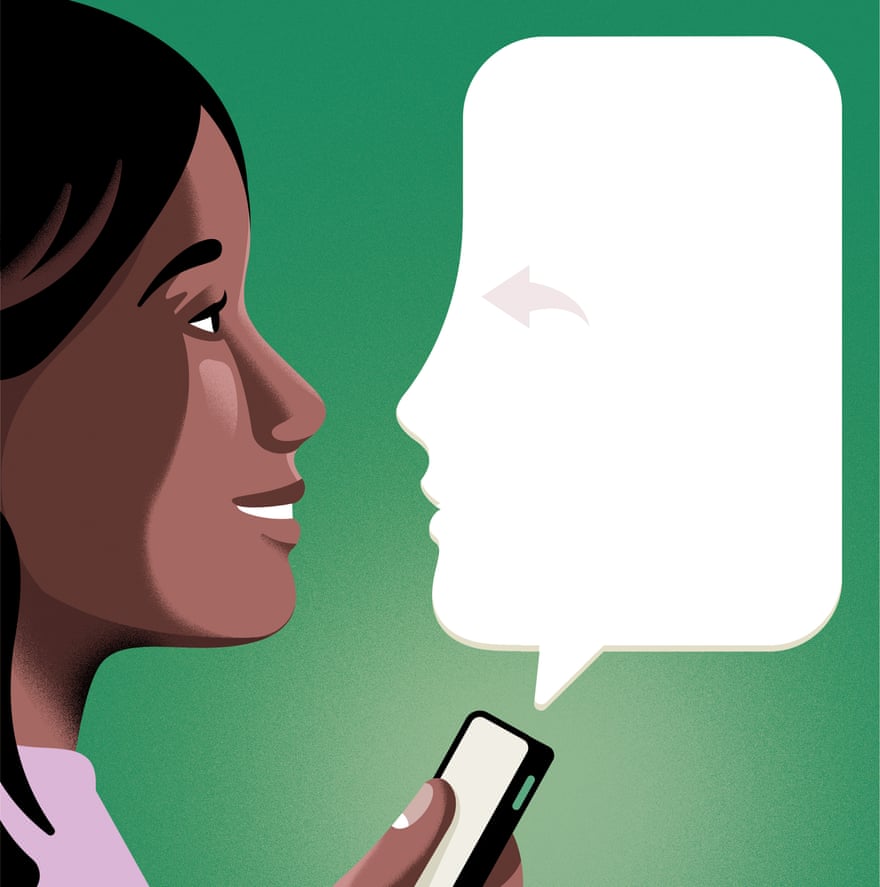Group chat overload: have we reached peak WhatsApp?

From pictures of puppies to deadly political manoeuvres, WhatsApp is the world’s most popular messaging platform. But is it losing its appeal?
Every morning before she leaves for work, Rosie, a 28-year-old physiotherapist, chats with her three housemates. Sometimes they commiserate or celebrate over the weather or football results; sometimes one of them has good news about a job interview to share or lets off steam about their latest dating app disaster.
The friends moved out of the house they shared in Bristol last summer when they left college, and they live in different towns now, but their WhatsApp group, named after the road they lived on together, starts pinging with messages around 7.30am most days. “I live on my own now, and I miss having company,” says Rosie. “Some of the others have moved back in with their parents, which has its own challenges. We make each other laugh and keep each other sane. We don’t get to meet up much, but the group chat has kept our little gang alive.”
The first of my WhatsApp group chats to light up today was my Wordle one. (Every Wordle group chat has one member who gets it in three lines before anyone else has both eyes open, right?) Next was the group I have with some of my oldest best friends, which is the sort of group chat where jokes that make no sense to anyone else make me snort with laughter. Then there was a emoji-laden update on a group set up for a snazzy upcoming birthday party and, for balance, an update – with photos – from a neighbour about the snail problem in her garden, as well as individual voice notes, which had arrived while I was sleeping, from my son and my cousin in Thailand and South Africa respectively.
“My email inbox is just work and spam and newsletters I can’t figure out how to unsubscribe from,” says my friend Simon. “My Instagram feed is gorgeous to look at, but it’s just entertainment, to be scrolled with a pinch of salt. WhatsApp is the bit on my phone where my real life happens.”
With 2 billion users, WhatsApp is the most popular messaging platform in the world, ahead of Facebook Messenger (988m) and WeChat (1.2bn). Launched by Yahoo alumni Brian Acton and Jan Koum in 2009, and bought by Facebook five years later, WhatsApp has infiltrated our lives at every level, from international politics – Boris Johnson was widely reported to have exchanged private messages with Saudi crown prince Mohammed bin Salman – to the politics of the school gate.
In Bond Street’s fashion flagships, sales assistants who once waited for big spenders to walk through the doors now WhatsApp photos of the hottest new deliveries to favoured customers as soon as they land in the store. Often the sale has gone through and the package dispatched by courier without the clothes ever hitting the shopfloor.
But have we reached peak WhatsApp? Lockdown was the platform’s age of innocence, with neighbourhood group chats pinging with pithy one-liners and a never-ending stream of cat videos keeping morale high between isolated work-from-home colleagues.
As the honeymoon period wears off, WhatsApp is starting to feel like yet another workstream, on top of all those unanswered emails and voicemails you never get around to listen to. The blue-tick system that shows whether a message has been read by the recipient, which seemed so useful at first, has become a social etiquette minefield.

The modern WhatsApp user has more correspondence to deal with than a Bridgerton sister after the Queen’s ball.
This year has also shown WhatsApp in a seedier light, under high court scrutiny over a lost password at the Wagatha Christie trial and with a cameo role in the downfall of a prime minister as messages revealed what Johnson did, in fact, know about Chris Pincher. Meanwhile, the recent introduction of a new “stealth” mode, allowing users to hide their “online” or “last seen” status from specific contacts, suggests the beginning of WhatsApp fatigue. Another promised update will allow users to exit a a group silently, with only the administrators notified of their departure.
Text messaging used to be a blunt back-and-forth exchange, a little like communicating by leaving notes on the fridge. By folding photos, videos – and other people – seamlessly into the exchange, WhatsApp chats have evolved to better mimic real-life conversation. Add a memoji for a facial expression, a gif for a laugh. The assumption that face-to-face communication is irreplaceable, already eroded by the smartphone era, has been further challenged by the enforced isolation of lockdowns and the long tail of work-from-home that has followed. There is no conversation so important or so delicate it can’t be conducted over text these days. Jill Biden recently revealed that she and her husband conduct arguments over text, to avoid being overheard by the ever-present security detail.
But it is the group chat functionality that has embedded itself in our everyday lives. The beauty of a group chat is not just its ability to keep a connection alive regardless of geography and time zone, but in “democratising the friendship group,” says journalist Scarlett Conlon, who has upward of a dozen groups active at any one time, and others archived but ready to jump back into life. (“Who Will Win Strictly”, for instance, is dormant for nine months of each year, but on fire during the autumn.)
“I still chat to lots of people one-on-one as well,” says Conlon. “But group chats are more inclusive of people who historically might have got information secondhand, because staying in touch maybe isn’t their strong point, or it’s not their thing to text a lot. People who struggle to find an ‘in’ can send a one-line update or gif to a group and it keeps them in the loop.”
READ RELATED: I had babies in Germany 10 years apart. This is what I learned about healthcare, motherhood and race
“I think what WhatsApp does for group friendships is brilliant,” agrees my sister Alice. (I don’t know how many group chats she is on, but she’s in five different groups that I am also in, as well as our one-on-one chat, so I’m guessing quite a few.) “It shifts the centre of gravity away from multiple individual friendships, which inevitably ebb and flow, and puts it in the middle of the group where it is accessible to everyone. The group becomes more bonded and more balanced, because no one is taking on all the emotional labour of arrangements, and no one is getting left out.”
Not everyone likes the background hum of cat videos, petition links and who had what for lunch. “My technophobe father abruptly left the family group one day – not realising the group would be notified – exclaiming to my mother that he ‘didn’t want to read about everyone’s sausages’,” says Joseph Kocharian, fashion director of Attitude magazine. “My brother stays out of the chat too, and lets the matriarchs of the family and myself, the gay son, run riot.”
Star turns on the chat include Kocharian’s aunt, whose commentary on a pilgrimage to Lindisfarne “read like an Alan Bennett story”, and his late grandmother, who posted red and black hearts in keeping with “her Cruella de Vil aesthetic of monochrome animal print and Chanel. She was strengthening her brand image on WhatsApp.”
Neighbourhood WhatsApp groups that sprang up during lockdown have evolved to reflect shifts in mood and priorities. Where I live, there are weeks when they are set by the national news agenda (a community hive-mind getting together to navigate the visa system for Ukrainian refugees), moments when local issues dominate (anyone know if the pizza place is closing for good?), and slow news days when a lost tortoise gets top billing.
The chat that can tip even tolerant users over the edge is the hen-night one, which operates on an emotional volume set to ear-splitting for months, full of granular organisational details. My friend Violet is on one of these, with “men and women I’ve never met updating me on childcare arrangements. That is your stuff – everyone has enough of their own stuff: 30 people don’t need to know your logistics.”
But WhatsApp is not just for friends and family. In Westminster, it rules. “I couldn’t do my job without WhatsApp,” says Jessica Elgot, the Guardian’s chief political correspondent. “There is no way you could operate as a political journalist without it. No 10 uses the platform to send out statements, party communications go through broadcast groups, and there is a huge press gallery group.”
Alliances between the modern intake of Tory MPs are now defined by who they’re in a WhatsApp group with, rather than which club they belong to. In WhatsApp, Westminster has found a platform that turbocharges its favourite sport: gossip. This is dangerous: MPs can be caught off-guard by the sotto voce feel of a message tapped on to a tiny green box, mistaking it for genuine privacy.
“What’s surprising is how indiscreet even experienced politicians can be,” says Elgot. “It gives you a sense of being among friends, but a big WhatsApp group isn’t like that.” Last year, screengrabs emerged showing Nadine Dorries being removed from a 100-strong group of Tory MPs over her fangirling of Boris Johnson. Steve Baker, former chair of the European Research Group, removed her with the comment “Enough is enough”. WhatsApp is trialling an “edit” button, which will allow for more subtle redactions than the “this message has been deleted” function.
The future of WhatsApp is still uncertain. (Anyone remember how crazy we were for Houseparty, back in April 2020?) In the UK, it is used by 75% of the population aged from 16-64, but takeup in the US, where SMS is still dominant, is only 23%. All over the world, it is less popular with teenagers than with older age groups. (Younger people already use the private story settings to create their own friendship “group chats” on Instagram and other platforms, rather than using those platforms to broadcast to everyone who follows them.)
And outside the worlds of politics and flagship fashion stores, WhatsApp has yet to be integrated into our ordinary work lives: my unscientific straw-polling concluded that while most of us appreciate the off-the-record vibe of an unofficial team group chat, with in-jokes and puppy photos, we draw the line at getting messaged by the boss. (“It feels like an invasion of what is supposed to be a safe space,” as my friend Isabel puts it.)
While it would not be accurate to say that WhatsApp retains an air of innocence – it is implicated in too many Westminster plots for that to be true – it does have, still, a kind of youthful energy which other social platforms lack, having been either flatlined by marketing (Instagram) or bulldozed into party lines (Twitter). WhatsApp still feels like a connection, not a workstream.
This has not escaped the notice of major brands. Most of us have got wise to the reality that “storytelling” is just a pretty word for being told why we should buy something. Next, surely, we need to steel ourselves against brands’ leveraging of the conversational back-and-forth format of WhatsApp into a business opportunity.
Facebook – now Meta, the owner of WhatsApp since 2014 – has, so far, honoured the wishes of the platform’s founders to keep it free of advertisements. But many analysts believe that one of the drivers of the acquisition of WhatsApp was that it supplied Meta with the one piece of the contact puzzle that eluded it – personal mobile phone numbers. In which case, monetisation of this data may be on the horizon.
But for now, WhatsApp is where we go for a chat. “When I’m walking home from work, I could look at the news on my phone, or check my step count, or update my to-do list,” says Rosie. “But I would much rather message my friends and find out what everyone’s cooking for dinner.”
How to win at WhatsApp
Source: Health & wellbeing | The Guardian




